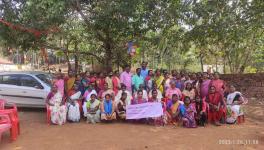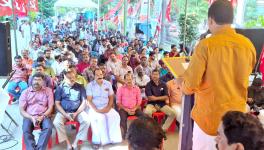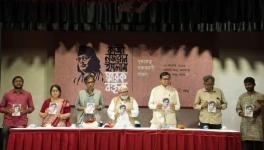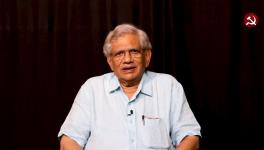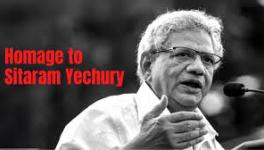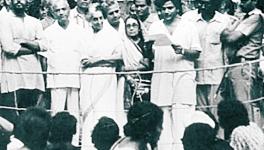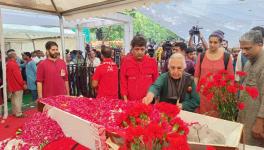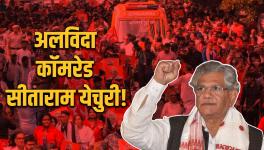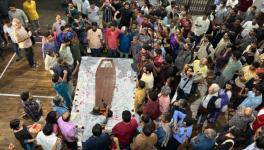EMS Smrithi 2021 and Evaluating Left Alternative in Kerala
Every year since 1998, when EMS Namboodiripad (former general secretary of Communist Party of India (Marxist) and Chief Minister of Kerala) passed away, an yearly event named EMS Smrithi has been held in Thrissur, Kerala, in the second week of June to commemorate him on his birth anniversary.
While it started as a study programme for left theory and praxis, EMS Smrithi has also often been a platform for left parties and acclaimed academicians, from within the country and abroad, to discuss and debate the national and international situation, and to put forward in front of the wider public their outlook on how to move ahead. Over the years, it has provided insight into the reasoning behind the positions taken by communist parties in India and the Left Democratic Front in Kerala. The general secretary of CPI(M) is a regular participant.
Last year, the Centre of Science and Technology for Rural Development (COSTFORD) Thrissur which organises the event, was forced to cancel EMS Smrithi due to the pandemic and ensuing lockdown restrictions. Faced with more or less the same situation this year with the rise in cases of COVID-19 in Kerala during the second wave, they decided to host the event virtually for the first time on June 13.
The theme this year was "Development Alternatives: The Experiences in Kerala", with panels held on Public Education and the Knowledge Economy, The Path Ahead for People’s Planning and Fighting Communalism: The Lessons from Kerala. Participants included current and former ministers and legislators of CPI and CPI(M) in Kerala and well-known academicians.
The panels and the subsequent discussions provided a glimpse into how the current LDF government in Kerala plans to move forward in the next five years, especially with regard to their plan to build a "New Kerala", and what left and democratic organisations and academics in the state view as challenges during this period.
Public Education and the Knowledge Economy
This session was presided over by Dr. R Bindu, Minister for Higher Education and Social Justice, Kerala. The panellists include M.A. Baby, former Minister of Education, and Dr. KN Ganesh, writer and historian.
Both the interim budget presented by former Finance Minister Dr. Thomas Isaac and the revised budget presented by current Finance Minister KN Balagopal earlier this month had laid stress on the development of the knowledge economy, with ₹300 crore earmarked for this purpose.
The LDF manifesto for the Assembly elections had outlined an ambitious plan to replicate the progress made in school education by rebuilding the higher education sector in Kerala, with promises of new universities, autonomous centres of excellence, upgradation of infrastructure, setting up of new courses, increase in available seats, establishment of new fellowships and expansion of existing scholarship funds while assuring academic independence, and securing democratic rights of students and academic/non-academic staff.
Also read: Kerala Elections: How the State’s Public Education Sector Was Revamped over Five Years
The discussions during this session revolved around the need for a people-centred outlook in building a knowledge-based economy that seeks to use advancements in science and technology for the benefit of the people, as opposed to a knowledge economy that is centred on the need for profit-maximisation. Such an economy, according to Dr. KN Ganesh, would stress on using information for the benefit of society and facilitate value-addition. The control of capital over information dissemination, whereby ideas are privatised and competition of individuals promoted, would need to be broken for enterprise to advance in a cooperative or collective manner.
The programmes to upgrade information and communication infrastructure, and provide internet for free to everyone in Kerala are seen as a means which would aid this. The participants also emphasised the need for such an outlook in order to create employment opportunities for educated youth, another big promise in the LDF manifesto.
The Path Ahead for People’s Planning
Presided over by AC Moideen, former Minister for Local Self Government,Kerala, this session saw the participation of Dr. Thomas Isaac, former Minister of Finance, and Prof. C Raveendranath, former Minister of Education.
Though the efforts of left parties to implement decentralisation had begun way back in 1958 with EMS as chair of the Administrative Reforms Committee appointed by the first communist government, concluding that there was a need for governance and democratic participation through village panchayats; they were prevented in making any progress on that front as the government was dismissed by the Centre in 1959.
It was only in 1996 that the much celebrated experiment in decentralisation of power to local governments began with the People’s Plan Campaign initiated by the then LDF government led by EMS, which viewed decentralisation as not just a means for financial devolution but as a means to ensure people’s participation and thereby advance democratisation.
Also watch: Left Triumph Will Help Transform the Very Base of the Economy, Says Thomas Isaac
In the 25 years following this radical move, the experience in Kerala stands different from that in many third world countries, where such experiments had been encouraged by the World Bank, which saw decentralisation, delegation and devolution as a means to bring in privatisation, and hence forced this as part of structural adjustments and reforms aimed at ‘downsizing’ elected governments.
The discussions during this session concentrated on the way to ensure justice while decentralising power, in order to facilitate direct participation and democratise governance. Prof. C Raveendranath was of the view that local self-government is a means to attack neoliberal ideology and resist imperialism, which demands the withdrawal of government from more and more areas for the benefit of international finance capital.
Dr. Thomas Isaac highlighted the need for a renewed effort at people’s planning in order to attain the goal of eradication of extreme poverty through generation of employment opportunities along with preparation of micro-plans and income transfer wherever required through local governments, another promise that the LDF manifesto had put forward.
Fighting Communalism: The Lessons from Kerala
The third session was presided over by MM Varghese, Secretary of CPI(M) Thrissur District Committee. A Vijayaraghavan, current Convenor of the LDF in Kerala; Kanam Rajendran, Secretary of CPI Kerala State Committee; and Dr. Sunil P Ilayidom, professor and public speaker, were the participants in this session.
At a juncture wherein the Bharatiya Janata Party, the ruling party at the Centre, has been pressing on with the implementation of corporate Hindutva policies with little or no respect for parliamentary norms and democratic discussion, the Sangh Parivar has aided them through the use of communalism as a means of dividing united struggles for sovereignty and democratic rights.
Kerala, over the last five years, has emerged in the forefront of fighting against this corporate-communal nexus, whether it be through the strong positions taken by both the state government and the people against the implementation of Citizenship Amendment Act/National Register of Citizens/National Population Register or the solidarity with the ongoing farmers protests at the borders of the national capital against the three farm laws introduced by the Union government.
The unity of the people against this brand of politics was witnessed in the outcome of the Assembly elections earlier this year, with the BJP drawing a blank and their vote-share also going down.
Also read: Why One State in India Is Showing Promising Signs of Democracy as the World Goes More Authoritarian
The discussions in this session focused on the need for class and mass organisations to strengthen the people’s struggle against communalism. Participants stressed that the left alternative should not be limited to economic policies, but also in building people’s unity in order to ensure social harmony. Drawing upon the ‘Renaissance’ movement in Kerala and its anti-caste and democratic roots would aid in building up this alternative even as dissent is being crushed and diversity is sought to be extinguished in the country.
Prof. Ilayidom also underscored the need to be wary of the BJP-RSS, for they have had successes in terms of propagating their regressive social and cultural views in spite of their electoral setbacks. The ideological struggle against communalism and brahminism would need to go hand-in-hand with the people’s struggle against corporate policies, he added.
Overall, the discussions fostered by the panels organised by COSTFORD, with the help of volunteers from progressive organisations in Thrissur, succeeded in setting the tone for the wider discourse around what an alternative to the policies favoured by the ruling party at the Centre would look like.
While delivering his inaugural address earlier, Sitaram Yechury, general secretary of CPI(M), had listed the emerging conflict situations between the big bourgeoisie and the peasants, the big bourgeoisie and the non-big bourgeoisie, and the Centre and the states. According to him, the left alternative should not be seen as reformism but as instruments for political mobilisation, struggle and change.
Prof. MN Sudhakaran, convenor of EMS Smrithi, expressed happiness at the feedback from the participants and the general public who attended the event. Over 50,000 people tuned in to the discussion across various platforms. A recording of the entire event can be viewed on their Facebook page.
Get the latest reports & analysis with people's perspective on Protests, movements & deep analytical videos, discussions of the current affairs in your Telegram app. Subscribe to NewsClick's Telegram channel & get Real-Time updates on stories, as they get published on our website.










